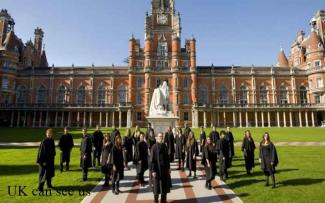The education system of the UK may seem perplexing, yet it is steeped in tradition and adhered to stringent guidelines.
Here is some of the fundamental information about the educational institutions.
In the UK, there are four stages in the education system, primary, secondary, further education (FE) and higher education (HE). All children from 5 to 16 years old must attend school full time. Further education is not compulsory for everyone and includes non-advanced education that may be pursued in HE institutions and other education colleges. HE is educated above GCE A levels and equivalents. It takes place at colleges, universities and other higher education institutions.
In the United Kingdom, education is also divided into "key stages," which are shown below.
Key Stage 1: 5 years old to 7 years old
Key Stage 2: 7 years old to 11 years old
Key Stage 3: 11 years old to 14 years old
Key Stage 4: 14 years old to 16 years old

Primary Education
In the United Kingdom, primary school education starts at the age of five and lasts till the age of eleven, encompassing key stages 1 and 2 of the educational system. Some of the primary schools are divided into two levels, one is infant and another is junior. Typically, these are distinct schools located in the similar property. Age range related to key stage 1 i.e., 5 to 7 years old is infant level and age range related to key stage 2 i.e., 7 to 11years old is junior level.
The main aim of this education is to ensure that all students have a basic understanding of numeracy and reading, and to also build a foundation for mathematics, science and other disciplines.
Secondary Education
In the United Kingdom, secondary school education starts at the age of eleven and lasts till the age of fourteen. Students should study a number of different courses such as Math, English, Design and Technology, ICT, Science, Art and Design, Citizenship, Music, Physical Education etc. Students do have the choice to select a few subjects that they are interested in. After students are done with the secondary education, they are usually entered for a number of external examinations.

Further Education
In a broad sense, the term "further education" refers to all non-advanced courses, following the completion of compulsory schooling. It is post-secondary education that distinguishes itself from university education. It is for the individuals who are above the age of 16, however it typically excludes universities. This comprises courses that are comparable to the one obtained in school, as well as sub degree courses that are comparable to those obtained in HE college.
Higher Education
Higher education includes courses that are above GCE A levels, Higher Grade of the SCE/National Qualification, GNVQ/NVQ level 3 or the Edexcel etc. HE courses are divided into three levels :
Postgraduate programs that lead to higher degrees, diplomas, and certifications
Undergraduate programs, including first-year degrees
Other undergraduate courses where all HE courses are included.
